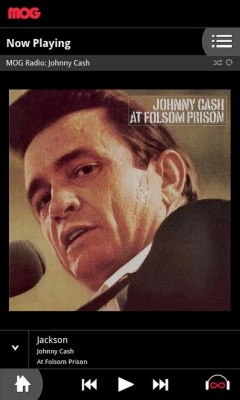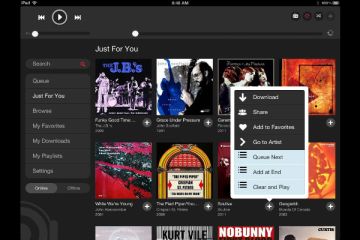MOG has been on death row ever since it was acquired by Beats Audio in 2012, but now the streaming music service has an execution date.
Beats will shut down MOG on April 15, as the company focuses on its new Beats Music service. MOG subscribers won’t automatically become Beats Music users, but they’ll get one month free with the new service, and Beats is looking into letting MOG subscribers easily transfer their billing info. Yearly MOG subscriptions will be refunded on a prorated basis.
I was a MOG subscriber from August 2010 to December 2012, and was a happy one for most of that time. MOG’s mobile apps were well-designed and offered better sound quality than other services. The music selection was extensive, so I was able to rely on MOG for almost all of my listening needs.

MOG was also forward-thinking about how users could access their music. On the web, it was one of the first music services to use HTML5 instead of Flash, and it felt fast and lightweight as a result. MOG quickly expanded beyond PCs and mobile devices, arriving on Roku set-top boxes in late 2010 and Sonos home stereo systems in early 2011. Around that time, MOG started working on automobile integration, cutting deals with BMW and Ford years ahead of streaming music mainstay Spotify.
But my favorite feature, one that made me the most hesitant to unsubscribe, was MOG Radio. You’d pick an artist, and MOG presented a sliding scale for listening to just that artist or a greater proportion of similar-sounding bands. As you adjusted the scale, you could see the mix of new artists morphing into your play queue. Plenty of other services have radio features now, but none have captured MOG’s magic. (Rdio comes the closest with its five-point “similar” to “adventurous” scale, but the execution isn’t as elegant; every time you adjust the scale, the song you’re listening to stops playing.)
After Beats acquired MOG in July 2012, it seemed that MOG was a dead music service walking. When the iPhone 5 launched that fall, it took nearly two months for MOG to support the larger screen. Founder David Hyman stepped down in November 2012, and in January 2013, Beats confirmed that it was working on a new service. MOG stopped updating its Android app last May, and iPhone updates stopped flowing in October.

Sadly and strangely, MOG’s greatest attributes aren’t part of the new Beats Music service. There’s no radio feature, and for now, Beats Music is only available on the iPhone, Android and the web, with Windows Phone support coming later this month. As for stereo and automobile integration, a Beats support page says there are “ongoing discussions with existing and new partners,” but no official commitments. To the casual observer, it’s hard to figure out exactly what Beats got for its $14 million, seeing as MOG’s features, integrations and co-founder didn’t make the transition. (A press release from June 2012 mentions “talent and technology,” though Beats has since done some of its own hiring.)
I’d say that MOG joins a long list of streaming music services that didn’t make it, but many of the other on-demand underdogs haven’t quit just yet. Rdio and Rhapsody are still around, and the former just stepped up its fight against Spotify with unlimited listening on the web. Slacker is reportedly profitable–a rarity in this business–thanks to a unique licensing model for its radio service. Even Grooveshark is still standing despite years of legal troubles. It makes me wonder what might have been if MOG hadn’t cashed out.
Still, I don’t begrudge Beats for shutting MOG down. It’s better to focus on one service, and Beats Music, with its clever recommdnations and existing brand appeal, would seem to have a better shot at success. My colleague Harry McCracken says Beats Music has some rough edges, but hopefully it can learn from MOG and become something even greater.

